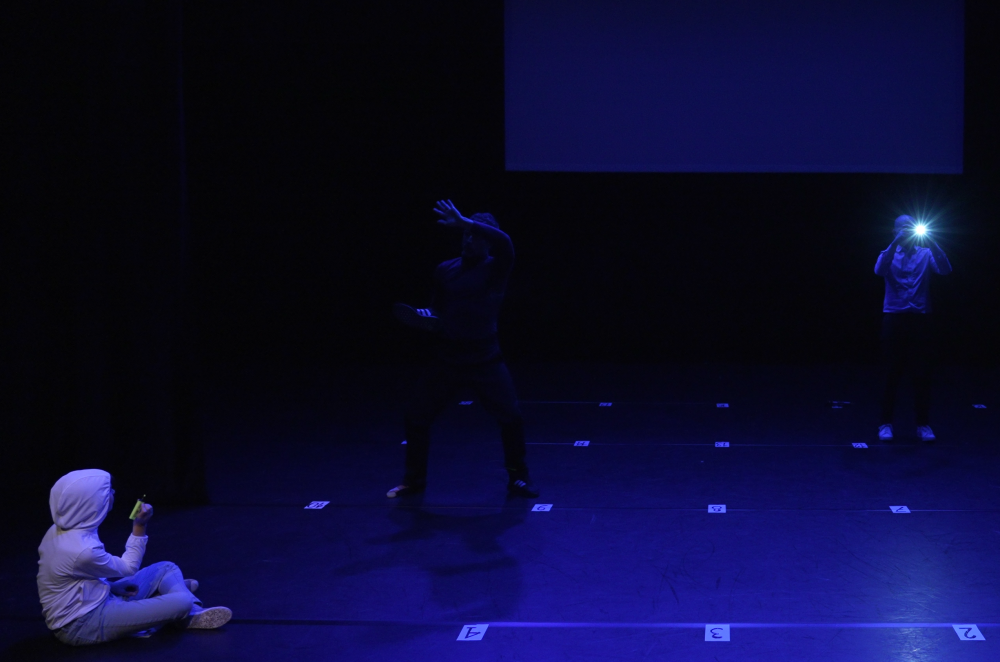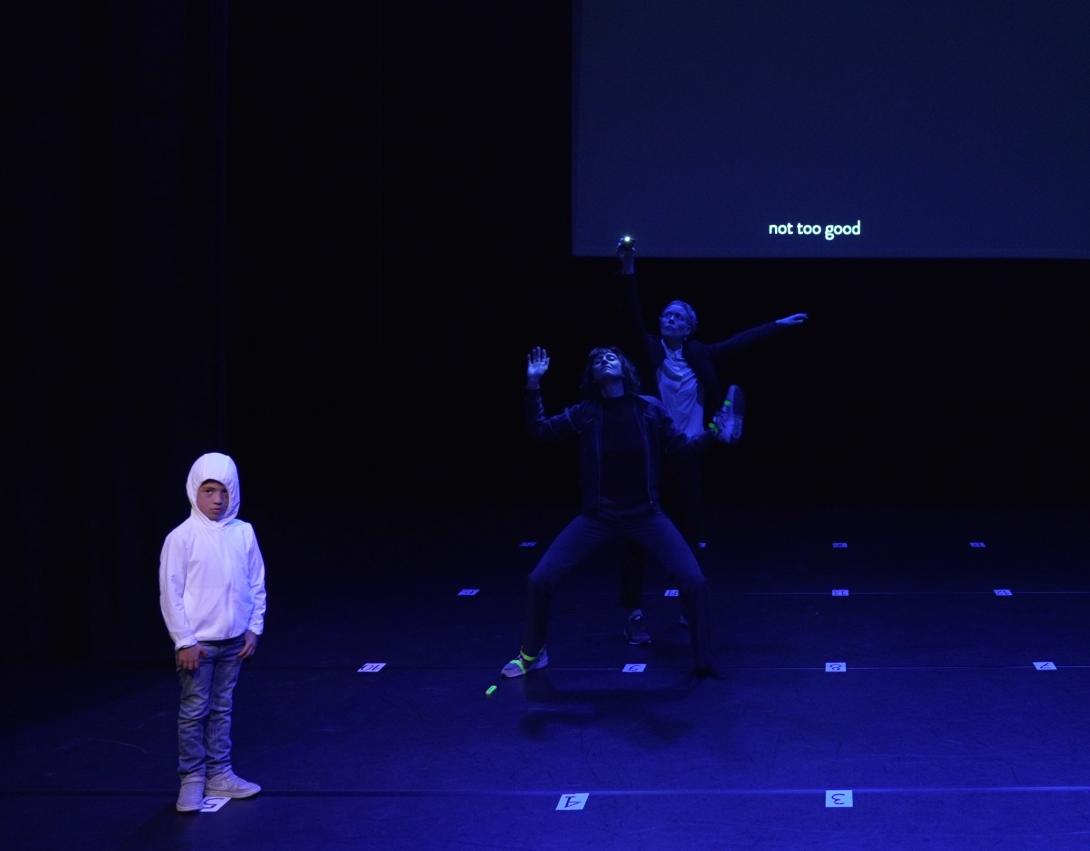Two adults and a child
This piece, like a lot of work being shown at the moment, was written for the most part during the pandemic, which in my case at times lent the research and writing a kind of hallucinatory dérive. The fictional premise is built upon a big patchwork of thoughts and quotes, stitched together more than anything by the spirit of one of Marguerite Duras’ last novels, Summer Rain (excerpts below in bold).
– Ant Hampton - September 2021
__
“C’est très.... très difficile à exprimer, Monsieur, je m’excuse... ce que je peux dire c’est que nous sommes des enfants d’une façon générale, vous voyez.”
"It's very.... very difficult to express, sir, I apologise... what I can say is that we are children in a general way, you see."
__
In Wenders’ film Der Himmel über Berlin (Wings of Desire), the angels walk around observing us, collecting anecdotes from our daily lives, and meeting in car showrooms to share their notes with each other. As they move around, they’re invisible - but not to children. It’s like the kids are their easygoing allies, with eyes, feet and agency in both real and spiritual spaces. And yet, in a kind of corollary to the angels’ inability to experience anything more than a view onto mortal life, we know that kids usually don’t get to pull the levers in how society works (the starting point for Darren O’Donnell’s great book Haircuts by Children, quoted at the beginning of Two Adults and a Child). I started to imagine today’s children gathering, like the angels, and tried to imagine what their notes might be like.
__
Ernesto était censé ne pas savoir encore lire à ce moment-là de sa vie et pourtant il disait qu’il avait lu quelque chose du livre brûlé. Comme ça, il disait, sans y penser et même sans le savoir qu’il le faisait, et puis qu’ensuite eh bien qu’ensuite, il ne s’était plus rien demandé ni s’il se trompait ni s’il lisait en vérité ou non ni même ce que ça pouvait bien être, lire, comme ça ou autrement. Au début il disait qu’il avait essayé de la façon suivante : il avait donné à tel dessin de mot, tout à fait arbitrairement, un premier sens. Puis au deuxième mot qui avait suivi, il avait donné un autre sens, mais en raison du premier sens supposé au premier mot, et cela jusqu’à ce que la phrase tout entière veuille dire quelque chose de sensé. Ainsi avait-il compris que la lecture c’était une espèce de déroulement continu dans son propre corps d’une histoire par soi inventée.
At this point in his life Ernesto was not yet supposed to be able to read, however he did say that he’d read something from the burnt book. Just like that, he said, without thinking about it, without even knowing he was doing it, and that afterwards, well, afterwards, he didn't ask himself whether he was wrong, or whether he was really reading or not, or even what it might be, to read, like this or otherwise. At first he said that he’d begun like this: he would assign, to any given outline of a word, quite randomly, a first meaning. Then he gave the second word that followed that another meaning, but one that was due to the first word’s assumed first meaning, and so on until the whole sentence ended up making some kind of sense. In this way he had understood that reading was a kind of continuous unfolding of a self-invented story, inside of one’s own body.
__
About ten years ago, I used a residency in Helsinki to try and find a way to let the two main characters in Waiting for Godot speak in a way that for me could make sense. They ended up whispering. I could imagine them singing (that doesn’t happen in the play), but not speaking out loud.
__
Quelquefois les brothers et les sisters, on dirait des petits animaux agglutinés les uns aux autres dans le sommeil, leurs cheveux les recouvrent de blondeur, leurs petits pieds sortent de dessous le tas. Quelquefois ils sont épars comme des petits enfants qu’on aurait jetés là dans un coin. Quelquefois on dirait qu’ils ont cent ans, qu’ils ne savent plus rien de comment on vit, de comment on joue, de comment on rit. […] Ils pleurent tout bas. Ils disent rien de ça qu’ils pleurent, mais rien. Ils disent : c’est rien, ça va passer.
Sometimes the brothers and sisters look like little animals clumped together in sleep, covered in blondness by their hair, little feet sticking out from under the pile. Sometimes they’re scattered like little kids someone’s thrown into a corner. Sometimes it’s like they’re a hundred years old, like they no longer know anything about how we live, how we play, how we laugh. [...] They cry softly. They don’t say anything about that, that they’re crying, nothing at all. They say: it's nothing, it will pass.
__
De Poétique de l'enfance chez Marguerite Duras par Anne Cousseau:
Dans la dernière phrase, citation directe des «brothers et des sisters », on retrouve le même type d’incorrection grammaticale que dans les phrases précédentes, comme si la narration reproduisez le parler enfantin. Et cependant l'emploi de l’adjectif «épars» témoigne d'une certaine recherche lexical qui ne peut être attribué aux enfants: curieux mélange, là encore, qui joue du mimétisme de la parole enfantine, tout en maintenant ostensiblement une certaine distance du narrateur avec les personnages.
From Poetics of childhood in Marguerite Duras by Anne Cousseau:
In the last sentence, a direct quotation from the "brothers and sisters", we find the same type of grammatical incorrectness as in the previous sentences, as if the narration reproduced childlike speech. And yet the use of the adjective "scattered" testifies to a certain lexical research that cannot be attributed to children: a curious mixture, here again, that plays on the mimicry of childish speech, while ostensibly maintaining a certain distance between the narrator and the characters.
__
In 2008 a job led me to work with the writer and philosopher Mladen Dolar. He wrote that year:
__
The voice is an invisible bodily missile, it consists in the mere passage from an inside to an outside, thereby producing both. It is itself neither inside nor outside, but in the transition, in the passage, in the extension. Its intension is its extension. But the voice is not on either side, it is what both enables this division and blurs it, it produces it and makes it paradoxical. There is a beautiful passage in Beckett, in The Unnamable:
__
“… I’ll have said it, without a mouth I’ll have said it, I’ll have said it inside me, then in the same breath outside me, perhaps that’s what I feel, an outside and an inside and me in the middle, perhaps that’s what I am, the thing that divides the world in two, on the one side the outside, on the other the inside, that can be as thin as foil, I’m neither one side nor the other, I’m in the middle, I’m the partition, I’ve two surfaces and no thickness, perhaps that’s what I feel, myself vibrating, I’m the tympanum, on the one hand the mind, on the other the world, I don’t belong to either”.
“et je l’aurai dit, sans bouche je l’aurai dit, je l’aurai entendu hors de moi, puis aussitôt dans moi, c’est peut-être ça que je sens, qu’il y a un dehors et un dedans et moi au milieu, c’est peut-être ça que je suis, la chose qui divise le monde en deux, d’une part le dehors, de l’autre le dedans, ça peut être mince comme une lame, je ne suis ni d’un côté ni de l’autre, je suis au milieu, je suis la cloison, j’ai deux faces et pas d’épaisseur, c’est peut-être ça que je sens, je me sens qui vibre, je suis le tympan, d’un côté c’est le crâne, de l’autre le monde, je ne suis ni de l’un ni de l’autre."
__
Les enfants, c’étaient des gens comme ça, qui comprenaient qu’on les abandonne. Sans comprendre, les enfants, ils comprenaient. Sans comprendre l’abandon, ils le comprenaient. C’était en quelque sorte naturel. Qu’on ait ce mouvement d’abandonner les enfants à un moment donné, d’ouvrir les mains et de lâcher, c’était naturel. Eux, leurs billes les plus belles, ils les perdent, alors. C’était aussi naturel qu’ils s’agrippent à la mère, qu’ils ne veuillent pas la lâcher. Eux, les brothers et les sisters, ils avaient encore dans la tête les espaces des premiers âges. Des espaces sombres, des peurs inintelligibles, inconsidérées, d’autoroutes désertes par exemple, d’orages, de nuits noires, de vent. Allez voir ce que ça dit certaines fois le vent, ce que ça crie.
The children, they were like that, people who had understood that we abandon them. Without understanding, they understood, the children. Without understanding abandonment, they understood it. It was somehow natural. That we have this movement of abandoning children at a given moment, of opening one’s hands and letting go - it was natural. So they lose their most beautiful marbles. It was as natural for them to cling to the mother, not wanting to let her go. They still had the spaces of the first years in their heads, the brothers and sisters. Dark spaces, unintelligible, mindless fears, of deserted motorways for example, of storms, of dark nights, of wind. Go and discover what the wind sometimes says, what it shouts.
__
I’m with Rita (who as dramaturg has shaped this piece importantly) talking with her father Alan Pauls - a writer and critic from Argentina - about Greta Thunberg, who to our surprise he’s never heard of. A few weeks later Rita shares a new text he has written called ‘child heros’, which ends like this:
__
"This is all wrong," she said last Friday in New York: "I shouldn't be here. I should be at school, on the other side of the ocean.
”She was repeating Brecht's heartbreaking dictum, in her own way: "Wretched is the country that needs heroes". It is another milestone on the heroic path: the moment when the hero discovers that her existence is not the solution to an unjust state of affairs but its symptom, its most decisive proof. In normal times, heroes are nature taken to its extreme limit.
Child heroes, on the other hand - and this is perhaps what makes someone like Greta Thunberg so fascinating - are an incongruity, a kind of aberration, an unnatural freak phenomenon. As unnatural as parents burying their children.
__
With thanks to Mladen Dolar (quote from his work for Manifesta 7, The Voice and the Fortress, 2008), and to Alan Pauls for his text Niños héroes, available at tinyurl.com/4b7u3jnz

